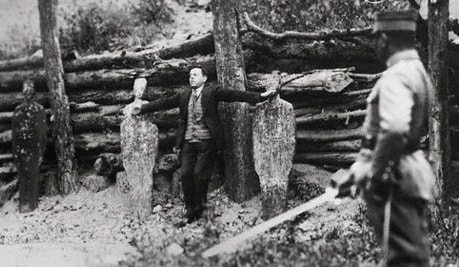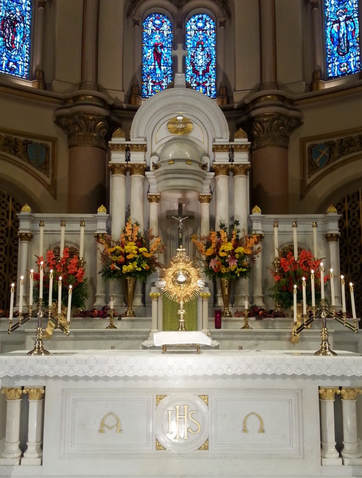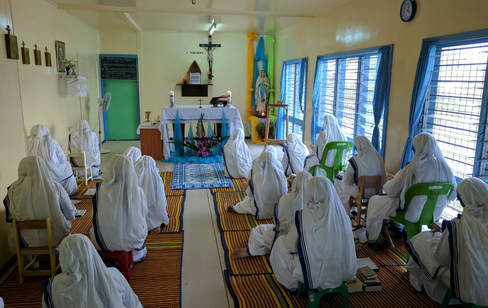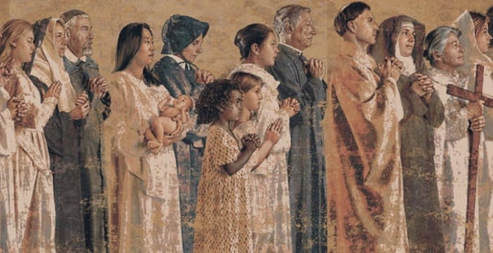 Fr. Miguel Pro, martyr, at his execution on November 23, 1927
Fr. Miguel Pro, martyr, at his execution on November 23, 1927 This week the Church celebrates “Christo Regis.” In Latin it sounds more direct—not Christ the King but simply “Christ King.” “Jesus of Nazareth,” wrote Pope Benedict, “is so intrinsically king that the title ‘king’ has actually become his name.” Indeed, the word Christos in Greek means “the anointed one,” from the verb chrio, to anoint (we get the word “chrism” from this verb). In the ancient world, Kings and priests were simply called the anointed ones, literally “those smeared with oil,” the christoi. We remember our dear Carmelites at Cristo Rey monastery ten blocks from here, founded by refugees from the persecutions in Mexico in the 1920s. Many were martyred in those years with the cry of Viva Cristo Rey on their lips, “long live Christ the king.” So it was that the Mexican priest, Blessed Miguel Pro, died on November 23, 1927 (we celebrated his feast day on Thursday, along with Thanksgiving). The local “king,” Plutarco Calles, president of Mexico, had him executed by firing squad when Catholicism was illegal in Mexico. He died with arms outstretched and the final words viva Cristo Rey.
Disappointing Leadership
The Feast of Christ the King may be difficult for us Americans to appreciate, given that we don’t trust kings. Down with King George, and up with democracy! But even democracy needs a strong leader, and for the past twenty years the weaknesses of our democracy have become evident. Neither the Democrats nor the Republicans have been able to achieve the necessary unity to lead this nation. Leaders at all levels of church and state lack decisive authority; they waffle and contradict themselves as much as they contradict each other; their lives often betray their own declared principles as is currently on graphic display in the news.
But we should not become unduly disappointed in our earthly leaders. They are after all only human. Our hope must not be in any president or political party. Ultimately only God has the capacity to rule humanity, precisely because this Ruler is above humanity. Only our Creator understands humanity from the inside and still loves each of us. And besides, all earthly rulers submit to Him sooner or later. No one really breaks the laws of God; we simply break against these natural laws. Neither God nor Mother Nature is mocked.
Love God
“I myself will tend my sheep,” God declares in the first reading. I will rescue them, because Israel’s kings have not governed them well. What are God’s laws? Our Lord gave us only two commandments: Love God, and love your neighbor. Love God first, beginning with right worship, with a devout and reverent attendance at Mass. If Christ is King, we will never miss a Sunday Mass if we can help it. With firm purpose we will come to Mass early to prepare for his divine presence, we will dress for the King in what is called our “Sunday best,” we will listen carefully to the readings and offer ourselves with him as the priest elevates the chalice. If Christ is our King, we will make Sunday Mass the center of our week. May God grant us a sacred and reverential fear of his divine presence in the Holy Mass!
Love Neighbor
May Christ give us also to reverence Him in each other! “When the Son of Man comes in his glory, he will sit upon his glorious throne with all the nations assembled before him.” And He will judge them. What is the one criterion by which God will judge us, according to today’s Gospel? Recognizing and loving Him in each other. “What you did for the least of my brothers,” the King says, “you did to me.” And who are these “least?” Certainly the poorest of the poor, the invisible people in San Francisco, like the ones we served with the French Sisters on Thanksgiving in the Tenderloin. But each of us lives and works with people we least like, or who least like us. It is of these people who irritate us, perhaps even disgust us, or whom we irritate, that Jesus speaks. Love them, and you love me. Give the troublesome a bit of your time, exercise patience with the noisome, call that relative you don’t want to call on his birthday, and you go to heaven. Ignore them, and you go to hell. Every man is Christ, in his sometimes distressing disguise. It’s as simple as that. Long live Christ the King within us!







 RSS Feed
RSS Feed